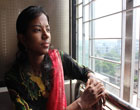A Flower That Will Never Die
The Story of Popy Rani Das
Written by Tasnia Shahjahan (2014)
Whether it is the best Thai cuisine in town, the roadside fuchka or simply mother’s home
cooked dinner, we all have our periodical cravings for our favorite food. Such was the
case for 21-year-old Popy Rani Das, until she took a leap into the wrong direction in life.
The malicious trap of marriage seized not only the little happiness that remained in
Popy’s life but also her ability to eat and drink her to satisfy her taste buds. Prior to her
birth her parents had filed for a divorce and her father passed away when she was only 5
years of age. Like many other rural areas in Bangladesh, young aged marriages have been
popular culture in Kishoreganj too. On January 2009 at the age of 21, as a medical
technician at Jahirul Islam Hospital in Gazipur, Popy got married to a young goldsmith
named ProdipBanik. Banik, hungry for dowry would abuse his wife day in day out.
Within 8 months, their marriage had gone sour.
On September 7, 2009, Popy, who had been suffering of a severe fever, had simply
requested her husband for a glass of water. The egregious acts that followed, is beyond
justifiable. Taking a gulp from the glass of water that she had thought would appease her
thirst and save her life had in reality been a gulp into acid that demolished her life. At
consumption, an instantaneous sensation of uneasiness ran down Popy’s esophagus.
Unsure of the situation and consequences, Popy gradually lost consciousness. At the
news of her unconciiousness, her beloved mother and aunt did not pay much attention
believing that it was simply a consequence of her fever. Only after three days had passed,
her mother, overwhelmed by the realization of what had happened, took her to the Jahirul
Islam Hospital, where she as an employee, received free treatment.
Soon after, she moved to the Acid Survivors Foundation where she, till date continues to
receive free of charge treatment as well as accommodation. In dismay Popy says, “This
feeling of perpetual thirst cannot be quenched; I cannot drink water.” 1 A completely
burnt throat and esophagus has left Popy to depend on mashed food provided to her
through an incision made in her abdomen. Through an education initiative that ASF had
taken on board after the termination of her treatment, Popy was enrolled into grade 9
under the Open University, spending a total of BDT 30, 000 as IGA support. This effort
however, became a futile attempt as a result of physician recommendation that Popy
remains at ASF and refrained from movement due to her incision.
This has also imposed a social barrier on Popy, acting as a interruption in terms of
engaging in proper employment despite her expertise in sewing, handicrafts and henna
art. Her excellence and talent in this field has permitted her to be serving as the trainer
and instructor of the Sewing and Handicrafts training sessions for the fellow survivors,
which is organized under the Income Generating Project at ASF, through the financial
contributions made by the King Baudouin Foundation, a Belgium based Donor Agency.
As an artistic individual Popy has also excelled in the music and art therapy sessions that
she receives at ASF. The post-incident trauma that Popy had encountered along with the
additional burden of societal discrimination had made it an arduous process for her to be
accepting of the situation. Nonetheless, Popy has shown a positive response to the
therapy sessions and has made notable progress in terms of physical health and
psychological conditions.
Marital life is often associated with affection and pleasure, yet for many individuals, such
as Popy, that life has taken such a bearing on the prosperous future they could perhaps be
living, that there is no turning back. Popy does not long for an opulent life; the fight for
survival remains the greatest fight in her life. For further treatment it is essential for Popy
to travel to Australia, however the exorbitant costs that are entailed with her case has
acted as a hitch to further progress. As a further encumbrance to Popy’s case, a lack of
prompt action by the police despite a lawsuit being filled, Banik has left to freely wander
the streets, perhaps as a potential threat to many other women and a motivation to many
such men.
Acid abuse cases, in regards to the failure of fulfilling dowry requirements or simply
refusal to relationship advancements have been very common in Bangladesh. The high
number of incidents like Popy’s is most remorseful, as the perpetrators are not held
accountable for their sinful and heinous actions. Little to no interest on behalf of the
authoritarian bodies has left this nation as an open invitation for such crimes to continue.
We the people, along with the policy makers and other authoritarian bodies of
Bangladesh, must take a stand against the perpetrators and to put an end to this
battlefield; to make all our citizens feel protected and sheltered within the borders of their
own motherland.
1
Translated by writer

